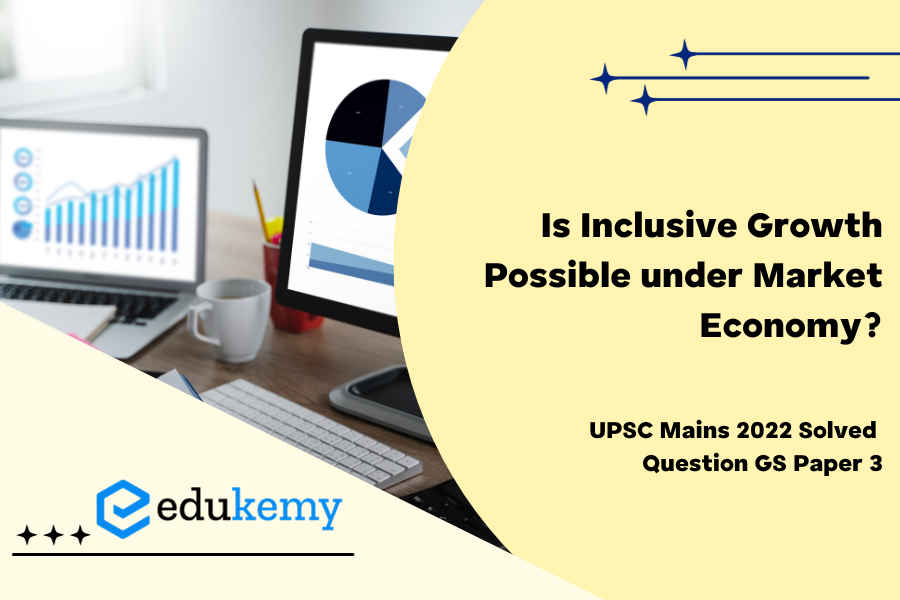Inclusive growth is possible within a market economy through policies that ensure equitable opportunities. Financial inclusion is vital for India’s economic growth, empowering marginalized populations by providing access to banking services, credit, and resources. It fosters widespread participation, bridging socio-economic gaps and promoting sustainable development.
UPSC Mains General Studies Paper – 3 Mains 2022
UPSC Mains Civil Services IAS Exam Question Paper – 2022
Contents
Approach
- Introducing with emphasising on keyword “ Inclusive Growth” under Indian market economy.
- Describe the financial inclusion in achieving economic growth in India
- Briefly suggest the way forward and significance of inclusive growth with Indian financial market.
Introduction
- Inclusive Growth is defined as “economic growth that is broad-based and benefits all segments of society, including the poor and disadvantaged. It is possible for inclusive growth to occur under a market economy, provided that certain conditions are met”.
- Inclusive growth is the idea that economic growth should be accompanied by an improvement in the living standards and well-being of all members of society, including disadvantaged and marginalised groups. While it is possible for inclusive growth to occur under a market economy, it is not an assurance and may require the implementation of certain policies and interventions. Atma Nirbhar with individual growth with public power parity .
Body
The significance of financial inclusion in achieving economic growth in India.


- Inclusive growth, also known as equitable growth, is a concept that emphasizes the importance of economic growth that benefits all members of society, regardless of their socio-economic status.
- In a market economy, where the allocation of resources is primarily determined by the interplay of supply and demand, achieving inclusive growth can be daunting. However, inclusive growth can be possible in a market economy with the right policies and strategies.
- This article will explore the concept of inclusive growth and its feasibility in a market economy. We will also discuss the importance of financial inclusion in achieving economic growth in India.
Yes, inclusive growth is possible under a market economy. A market economy, with proper regulations and policies, can foster conditions for inclusive growth by providing opportunities for all segments of society to participate and benefit from economic activities.
- Financial inclusion also contributes to poverty reduction by empowering individuals to manage risks, smooth consumption, and accumulate assets. It enhances social welfare by improving livelihoods, promoting social mobility, and reducing income inequality.
Financial inclusion plays a significant role in achieving economic growth in India. By expanding access to financial services and products, such as banking, credit, and insurance, to marginalised and underserved populations, financial inclusion promotes inclusive growth. It enables individuals and businesses to save, invest, and access capital, leading to increased economic productivity and entrepreneurship.
Example: Jan Dhan Yojana , Mudra schemes etc.
Conclusion
- Indian government along with the state governments and local governments should continue to focus on eradicating poverty and achieving sustainable development in order to improve the lives of India’s people.
- Through innovative partnerships with an international organisation, civil societies, and private companies, inclusive and equitable growth can be targeted. Inclusive growth will help in the empowerment of vulnerable and marginalised populations, improve livelihoods, and augment skill-building for women.
In case you still have your doubts, contact us on 8792740517.
For UPSC Prelims Resources, Click here
For Daily Updates and Study Material:
Join our Telegram Channel – Edukemy for IAS
- 1. Learn through Videos – here
- 2. Be Exam Ready by Practicing Daily MCQs – here
- 3. Daily Newsletter – Get all your Current Affairs Covered – here
- 4. Mains Answer Writing Practice – here


